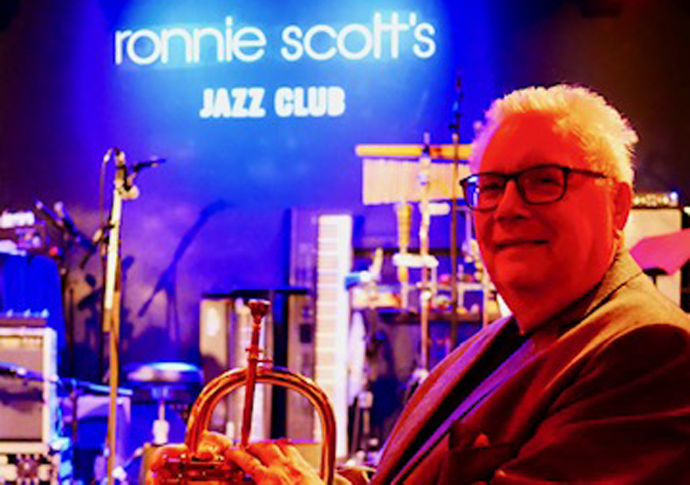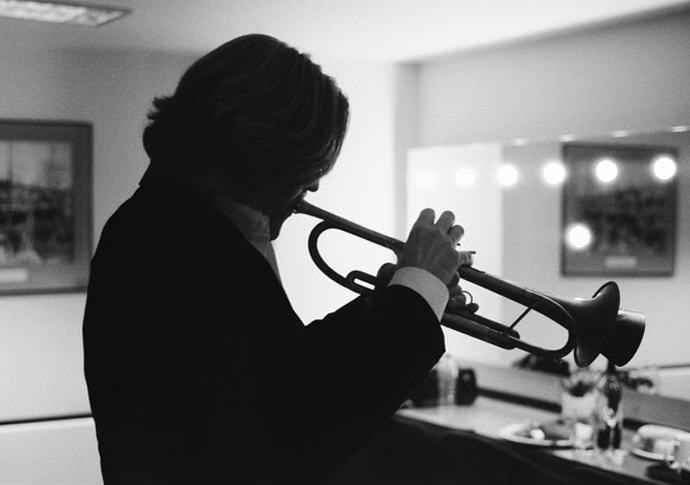Giving up my flugel was a blow – but I found the best way to do it
On the horns of a dilemma, Rob Ryan decides to part with a much-loved instrument
Friday, 7th February 2025 — By Rob Ryan

Flugel for thought: Rob Ryan at Ronnie Scott’s [Jonathan Futrell]
I HAVE been in Ronnie Scott’s many, many times, but never on a Saturday afternoon and have certainly never had my heart broken there. Ronnie’s is all about elation, not regret. But then, on a recent Saturday, I was about to give something precious away. An instrument.
Some years ago, I was working on a novel set in a trailer park in the US. I wanted the hero to be a trumpet player and, at some point, to have to sell his horn in order to fund a search for a young lad who had gone missing from the park. I tracked down top trumpet player Guy Barker, whom I had seen and heard at Ornette Coleman and Billy Cobham gigs and asked him if he would help with some technical details.
Yes, he said. When we went to get taxis home, it turned out we lived in parallel roads in Muswell Hill (he’s in Chiswick now and I’m in Kentish Town). We became friends and have even collaborated on projects since then.
I eventually bought myself a rather careworn trumpet and set about practising not just the playing but the stripping down and cleaning rituals (prior to the hero hocking it). My wife Deborah even bought me lessons, from a young man called Henry Collins who went on to play in the Amy Winehouse Band. In fact, he still does – they are regulars at places like Koko in Camden and are currently touring what we used to call The Continent.
When I finally delivered the book, my editor loved it. Apart from one thing. “Lose the trumpet player,” he said. “But I’ve just learned to play Love Theme from Spartacus,” I protested, to no avail. My protagonist became a guitarist. But I didn’t buy a guitar. I wasn’t going to make that mistake twice.
During the course of my over-research into the trumpet, I had mentioned how much I loved the warmer, more melancholic sound of the slightly larger flugelhorn, as played by Kenny Wheeler, Art Farmer and Ian Carr. Me and my big mouth. I had a big birthday coming up and, unbeknown to me, Deb plotted to buy me one.
She went to a well-known brass instrument establishment and explained what she wanted and was duly presented with a shiny flugel on the counter top.
“Hold on,” she said. “I’m not sure. Do you mind if I make a phone call?” The assistant shrugged. Deb called Guy, who was in Hong Kong. “Put the server on,” he said. Deb handed her phone over, saying “It’s Guy Barker.”
The assistant went pale. After some spluttering, he said “No, Guy. Yes, Guy. You’re right, this isn’t the flugelhorn she’s looking for. I’ll sort it.”
And he did. It’s a lovely instrument, but I simply don’t do it justice. I sort of played it at my daughter’s wedding recently, although luckily Guy stepped out from behind a curtain to perform Cole Porter’s I Love You as intended.
It has mostly been back in its case since then, although I sometimes lift it out to give it a polish and oil the valves. The thing is, hanging around with Guy and people like Nathan Bray and Tom Rees-Roberts and listening to Mark Kavuma, Poppy Daniels or Sheila Maurice-Grey, I know I’ll never be in the same trumpet universe as them, even if I did have the wherewithal to put in the hard hours. And the other thing is, that flugel should be played. It demands to be played. I feel like those people who buy beautiful vintage cars, lock them in a garage and never drive them.

Guy Barker
Which is how I ended up at Ronnie Scott’s on that recent Saturday afternoon. For the past 10 years the club has run a non-profit charitable foundation that supports jazz and young jazz musicians. One of the initiatives is the Musical Instrument Amnesty, which happens every two years or so. You turn up at the club and hand over your unwanted, unloved, criminally underplayed saxophone, guitar, trumpet, violin… whatever. Ronnie’s then finds a home for it with a struggling musician.
Where do they end up? Ada Ologbosere of the RS Foundation explains: “We distribute instruments through our extended networks, primarily by holding school workshops at the club and providing grants to youth music charities. For example, this year, we funded several organisations across the country, including Serious Trust, to host jazz-focused workshops during the EFG London Jazz Festival. We have also committed to ongoing funding for Kinetika Bloco, a youth music charity comprising young brass and woodwind players, drummers, steel pan, and dancers.
“Our outreach programme, Ronnie’s On The Road, allows us to partner with various schools and organisations across London. This initiative enables us to connect with young adults who, for various reasons, cannot or choose not to leave their borough.”
It isn’t just the UK – Ronnie’s has sent instruments to Africa via Brass For Africa – https://www.brassforafrica.org/) and to Europe (via Sistema Europe – https://www.sistemaeurope.org/).
So, who knows where my flugel will end up? Well, I hope I will.
I arrived quite late in the afternoon of donations and the room was pretty rammed with around a hundred instruments. The standard jazz joke would be to say they were all trombones, but there were guitars, keyboards, drum sets, violins, trumpets… and the odd trombone.
Each instrument is assigned a number at check in and those that are particularly notable are given a star. My flugel got one of those, which means Ronnie’s will do its very best to keep track of where it ends up and who will play it. Ada kindly offered me the chance to go up onto that hallowed stage and give one last toot, but my mouth went dry at the very thought, especially as RS Orchestra’s estimable Pete Long was in the room checking out the instruments. So, I simply waved it off as it disappeared upstairs.
And yes, I did ask Deborah’s permission before saying goodbye to her gift.
• You can contact the Ronnie Scott’s Charitable Foundation on foundation@ronniescotts.co.uk to find out when the next amnesty will be, although it is also announced on social media – just follow the club on whatever platform (links on www.ronniescotts.co.uk). But if you have an instrument burning a hole in its case right now, north London’s Young Music Makers charity (which offers subsidised music lessons) will take it off your hands see: https://www.youngmusicmakers.co.uk
• And here’s a quick recommendation for your diary – the Misha Mullov-Abbado sextet play Kings Place on February 22. The bassist won’t thank me for reminding everyone he is the son of the late great conductor Claude Abbado and violist Viktoria Mullova, but there’s no nepo baby vibes here, just strong musical genes, as he is a very talented young man.
His fourth album Effra (Ubuntu) is out now and, thanks to their shared history, his group of six musicians (alto, tenor, trumpet, piano, drums and bass) sound like a much larger band: big, bright and dynamic from the get go. The record is inspired by Mishi’s life in Brixton and like that community, it eclectically and energetically ranges far and wide, from swing to classical to Latin, from infectious grooves to heartfelt ballads. It has been suggested that some of his previous albums were a little polite and maybe too polished, but that’s not the case here – there is punchy solo work aplenty, and as well as having a beautiful and inviting tone to his bass, Mishi writes a very catchy tune. I suspect the music will take on an even more pugilistic attitude live when they play Kings Place (tickets at https://shop.kingsplace.co.uk/31023/31024).
Also recommended is saxophonist Tom Smith’s A Year in the Life (released Feb 21 on Fey Moose/ECN), which features a real big band, stuffed with great players. More on that record and Tom’s philosophy on big bands nearer to his next live gig.